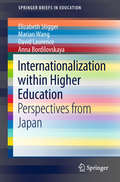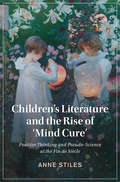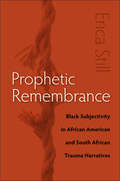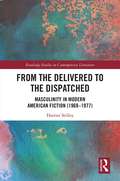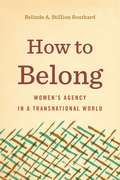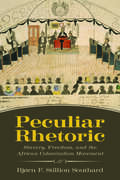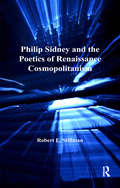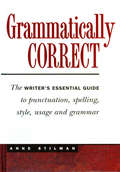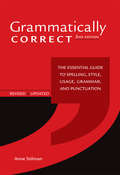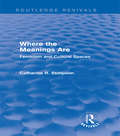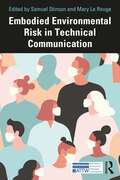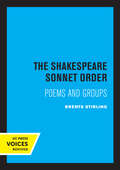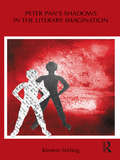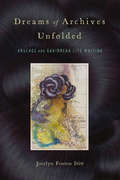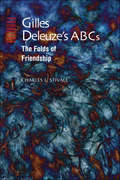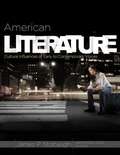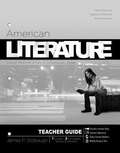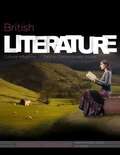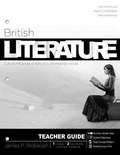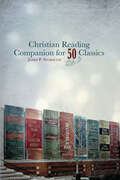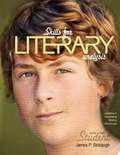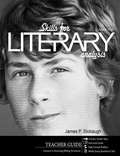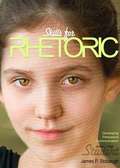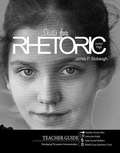- Table View
- List View
Internationalization within Higher Education: Perspectives From Japan (SpringerBriefs in Education)
by Elizabeth Stigger Marian Wang David Laurence Anna BordilovskayaThis book discusses what internationalization practices are and the different ways that they are being implemented by higher education institutions in Japan, from a bottom-up perspective. It reflects the current situation faced by many Japanese universities in the context of the changing landscape in higher education and considerations in implementing changes to course curricula, programs, and university admissions with regard to internationalization. The four case studies presented provide readers with clear examples of how the internationalization of higher education institutions is developing within the Japanese higher education system, and the issues that different higher education institutions face in this process.
Children's Literature and the Rise of ‘Mind Cure': Positive Thinking and Pseudo-Science at the Fin de Siècle (Cambridge Studies in Nineteenth-Century Literature and Culture #126)
by Anne StilesPositive thinking is good for you. You can become healthy, wealthy, and influential by using the power of your mind to attract what you desire. These kooky but commonplace ideas stem from a nineteenth-century new religious movement known as 'mind cure' or New Thought. Related to Mary Baker Eddy's Christian Science, New Thought was once a popular religious movement with hundreds of thousands of followers, and has since migrated into secular contexts such as contemporary psychotherapy, corporate culture, and entertainment. New Thought also pervades nineteenth- and early twentieth-century children's literature, including classics such as The Secret Garden, Anne of Green Gables, and A Little Princess. In this first book-length treatment of New Thought in Anglophone fiction, Anne Stiles explains how children's literature encouraged readers to accept New Thought ideas - especially psychological concepts such as the inner child - thereby ensuring the movement's survival into the present day.
Popular Fiction and Brain Science in the Late Nineteenth Century
by Anne StilesIn the 1860s and 1870s, leading neurologists used animal experimentation to establish that discrete sections of the brain regulate specific mental and physical functions. These discoveries had immediate medical benefits: David Ferrier's detailed cortical maps, for example, saved lives by helping surgeons locate brain tumors and haemorrhages without first opening up the skull. These experiments both incited controversy and stimulated creative thought, because they challenged the possibility of an extra-corporeal soul. This book examines the cultural impact of neurological experiments on late-Victorian Gothic romances by Robert Louis Stevenson, Bram Stoker, H. G. Wells and others. Novels like Dracula and Dr Jekyll and Mr Hyde expressed the deep-seated fears and visionary possibilities suggested by cerebral localization research, and offered a corrective to the linearity and objectivity of late Victorian neurology.
Prophetic Remembrance: Black Subjectivity in African American and South African Trauma Narratives
by Erica StillUsing the term "prophetic remembrance" to articulate the expression of a constituent faith in the performative capacity of language, Erica Still shows how black subjectivity is born of and interprets cultural trauma. She brings together African American neo-slave narratives and Black South African postapartheid narratives to reveal the processes by which black subjectivity accounts for its traumatic origins, names the therapeutic work of the present, and inscribes the possibility of the future. The author draws on trauma studies, black theology, and literary criticism as she considers how writers such as Toni Morrison, Charles Johnson, John Edgar Wideman, David Bradley, Sindiwe Magona, K. Sello Duiker, and Zakes Mda explore the possibilities for rehearsing a traumatic past without being overcome by it. Although both African American and South African literary studies have addressed questions of memory, narrative, and trauma, little comparative work has been done. Prophetic Remembrance offers this comparative focus in reading these literatures together to address the question of what it means to remember and to recover from racial oppression.
From the Delivered to the Dispatched: Masculinity in Modern American Fiction (1969-1977) (Routledge Studies in Contemporary Literature)
by Harriet StilleyFrom the Delivered to the Dispatched: Masculinity in Modern American Fiction (1969-1977) focuses on masculinity in late twentieth-century American fiction. This rigorous study shows the ways post-war American authors engage with the tension between capitalist consumer culture and traditional national conceptions of American manhood. Drawing on examples from the works of prolific contemporary American writers, Cormac McCarthy, Toni Morrison and Michael Herr, Stilley investigates hypermasculine male violence, the classical and grotesque body, as well as specific regional themes such as the Western frontier, the American Adam, the Southern Gothic and the Suburban Gothic.
How to Belong: Women’s Agency in a Transnational World (Rhetoric and Democratic Deliberation #18)
by Belinda A. Stillion SouthardIn How to Belong, Belinda Stillion Southard examines how women leaders throughout the world have asserted their rhetorical agency in troubling economic, social, and political conditions. Rather than utilizing the concept of citizenship to bolster political influence, the women in the case studies presented here rely on the power of relationships to create a more habitable world.With the rise of global capitalism, many nation-states that have profited from invigorated flows of capital have also responded to the threat of increased human mobility by heightening national citizenship’s exclusionary power. Through a series of case studies that include women grassroots protesters, a woman president, and a woman United Nations director, Stillion Southard analyzes several examples of women, all as embodied subjects in a particular transnational context, pushing back against this often violent rise in nationalist rhetoric. While scholars have typically used the concept of citizenship to explain what it means to belong, Stillion Southard instead shows how these women have reimagined belonging in ways that have enabled them to create national, regional, and global communities.As part of a broader conversation centered on exposing the violence of national citizenship and proposing ways of rejecting that violence, this book seeks to provide answers through the powerful rhetorical practices of resilient and inspiring women who have successfully negotiated what it means to belong, to be included, and to enact change beyond the boundaries of citizenship.
Peculiar Rhetoric: Slavery, Freedom, and the African Colonization Movement (Race, Rhetoric, and Media Series)
by Bjorn F. Stillion SouthardWinner of the 2020 Marie Hochmuth Nichols Award from the Public Address Division of the National Communication AssociationThe African colonization movement occupies a troubling rhetorical territory in the struggle for racial equality in the United States. For white colonizationists, the movement seemed positioned as a welcome compromise between slavery and abolition. For free blacks, colonization offered the hope of freedom, but not within America’s borders. Bjørn F. Stillion Southard indicates how politics and identity were negotiated amid the intense public debate on race, slavery, and freedom in America. Operating from a position of power, white advocates argued that colonization was worthy of massive support from the federal government. Stillion Southard pores over the speeches of Henry Clay, Elias B. Caldwell, and Abraham Lincoln, which engaged with colonization during its active deliberation. Between Clay’s and Caldwell’s speeches at the founding of the American Colonization Society (ACS) in 1816 and Lincoln’s final public effort to encourage colonization in 1862, Stillion Southard analyzes the little-known speeches and writings of free blacks who wrestled with colonization’s conditional promises of freedom. He examines an array of discourses to probe the complex issues of identity confronting free blacks who attempted to meaningfully engage in colonization efforts. From a peculiarly voiced “Counter Memorial” against the ACS to the letters of wealthy black merchant Louis Sheridan negotiating for his passage to Liberia to the civically minded orations of Hilary Teage in Liberia, Stillion Southard brings to light the intricate rhetoric of blacks who addressed colonization to Africa.
Philip Sidney and the Poetics of Renaissance Cosmopolitanism
by Robert E. StillmanCelebrations of literary fictions as autonomous worlds appeared first in the Renaissance and were occasioned, paradoxically, by their power to remedy the ills of history. Robert E. Stillman explores this paradox in relation to Philip Sidney's Defence of Poesy, the first Renaissance text to argue for the preeminence of poetry as an autonomous form of knowledge in the public domain. Offering a fresh interpretation of Sidney's celebration of fiction-making, Stillman locates the origins of his poetics inside a neglected historical community: the intellectual elite associated with Philip Melanchthon (leader of the German Reformation after Luther), the so-called Philippists. As a challenge to traditional Anglo-centric scholarship, his study demonstrates how Sidney's education by Continental Philippists enabled him to dignify fiction-making as a compelling form of public discourse-compelling because of its promotion of powerful new concepts about reading and writing, its ecumenical piety, and its political ambition to secure through natural law (from universal 'Ideas') freedom from the tyranny of confessional warfare. Intellectually ambitious and wide-ranging, this study draws together various elements of contemporary scholarship in literary, religious, and political history in order to afford a broader understanding of the Defence and the cultural context inside which Sidney produced both his poetry and his poetics.
Grammatically Correct: An Essential Guide to Punctuation, Style, Usage and More
by Anne StilmanHow does good writing stand out? If its purpose is to convey facts, findings, or instructions, it need be read only once for its content to be clear. If its purpose is to entertain or to provoke thought, it makes readers want to come back for more.Revised and updated, this guide covers four essential aspects of good writing:Individual words: spelling variations, hyphenation, frequently confused homonyms, frequently misused words and phrases, irregular plurals and negatives, and uses of capitalization and type style to add special meanings. Punctuation: the role of each mark in achieving clarity and affecting tone, and demonstration of how misuses can lead to ambiguity. Syntax and structure: agreement of subject and verb, parallel construction, modifiers, tenses, pronouns, active versus passive voice, and more. Style:advice on the less hard-and-fast areas of clarity and tone, including sentence length and order, conciseness, simplification, reading level, jargon and cliches, and subtlety. Filled with self-test exercises and whimsical literary quotations, Grammatically Correct steers clear of academic stuffiness, focusing instead on practical strategies and intuitive explanations. Discussions are designed to get to the heart of a concept and provide a sufficient sense of when and how to use it, along with examples that show what ambiguities or misinterpretations might result if the rules are not followed. In cases where there is more than one acceptable way to do something, the approach is not to prescribe one over another but simply to describe the options. Readers of this book will never break the rules of language again - unintentionally.
Grammatically Correct (2nd Edition): The Essential Guide to Spelling, Style, Usage, Grammar, and Punctuation
by Anne StilmanHow does good writing stand out? If its purpose is to convey facts, findings, or instructions, it need be read only once for its content to be clear. If its purpose is to entertain or to provoke thought, it makes readers want to come back for more. Revised and updated, this guide covers four essential aspects of good writing: Individual words - spelling variations, hyphenation, frequently confused homonyms, frequently misused words and phrases, irregular plurals and negatives, and uses of capitalization and type style to add special meanings Punctuation - the role of each mark in achieving clarity and affecting tone, and demonstration of how misuses can lead to ambiguity Syntax and structure - agreement of subject and verb, parallel construction, modifiers, tenses, pronouns, active versus passive voice, and more Style - advice on the less hard-and-fast areas of clarity and tone, including sentence length and order, conciseness, simplification, reading level, jargon and clichés, and subtletyFilled with self-test exercises and whimsical literary quotations, Grammatically Correct steers clear of academic stuffiness, focusing instead on practical strategies and intuitive explanations. Discussions are designed to get to the heart of a concept and provide a sufficient sense of when and how to use it, along with examples that show what ambiguities or misinterpretations might result if the rules are not followed. In cases where there is more than one acceptable way to do something, the approach is not to prescribe one over another but simply to describe the options. Readers of this book will never break the rules of language again - unintentionally.
Where the Meanings Are: Feminism and Cultural Spaces (Routledge Revivals)
by Catharine R. StimpsonFirst published in 1990, this collection of essays in literary criticism, feminist theory and race relations was named one of the top twenty-five books of 1988 by the Voice Literary Supplement. The title covers such subjects as black literature; the reconstruction of culture, changing arts, letters and sciences to include the topics of women and gender; and, the nature of family and the changing roles of women within society. As such, Catharine Stimpson employs a transdisciplinary approach, to encourage greater understanding of the differences among women, and thus socially-constructed differences in general. Where the Meanings Are tells of some of the arguments within feminism during the re-designing and designing of cultural spaces, as post-modernism began to change the boundaries of race, class, and gender. It will therefore be of great value to students and general readers with an interest in the relationship between gender and culture, sex and gender difference, feminist theory and literature.
Embodied Environmental Risk in Technical Communication: Problems and Solutions Toward Social Sustainability (ATTW Series in Technical and Professional Communication)
by Samuel StinsonThis collection calls for improved technical communication for the public through an embodied, situated understanding of environmental risk that promotes social justice. In addition to providing a series of chapters about recent issues on risk communication, this volume offers a diverse look at methodological practices for students, researchers, and practitioners looking to address embodied aspects of crisis and risk that incorporate UX, storytelling, and dynamic text. It includes chapters that bring embodiment to the forefront of risk communication, highlighting the cycle of content creation, dissemination, public response and decision making, continuing iterations of educational efforts, and recovery, toward increasing adaptive capacity as a whole. In addition, this work directs necessary attention to overcoming perceptual difficulties, memory lapses, definitional differences, access issues, and pedagogical problems in the communication of risks to diverse publics. This collection is essential reading for scholars and can be used as a supplemental text or casebook for courses in technical communication, environmental communication, risk and crisis communication, science communication, and public health.
The Shakespeare Sonnet Order: Poems and Groups
by Brents StirlingThis title is part of UC Press's Voices Revived program, which commemorates University of California Press’s mission to seek out and cultivate the brightest minds and give them voice, reach, and impact. Drawing on a backlist dating to 1893, Voices Revived makes high-quality, peer-reviewed scholarship accessible once again using print-on-demand technology. This title was originally published in 1968.
Peter Pan's Shadows in the Literary Imagination (Children's Literature and Culture)
by Kirsten StirlingThis book is a literary analysis of J.M. Barrie’s Peter Pan in all its different versions -- key rewritings, dramatisations, prequels, and sequels -- and includes a synthesis of the main critical interpretations of the text over its history. A comprehensive and intelligent study of the Peter Pan phenomenon, this study discusses the book’s complicated textual history, exploring its origins in the Harlequinade theatrical tradition and British pantomime in the nineteenth century. Stirling investigates potential textual and extra-textual sources for Peter Pan, the critical tendency to seek sources in Barrie’s own biography, and the proliferation of prequels and sequels aiming to explain, contextualize, or close off, Barrie’s exploration of the imagination. The sources considered include Dave Barry and Ridley Pearson’s Starcatchers trilogy, Régis Loisel’s six-part Peter Pan graphic novel in French (1990-2004), Andrew Birkin’s The Lost Boys series, the films Hook (1991), Peter Pan (2003) and Finding Neverland (2004), and Geraldine McCaughrean’s "official sequel" Peter Pan in Scarlet (2006), among others.
Dreams of Archives Unfolded: Absence and Caribbean Life Writing (Critical Caribbean Studies)
by Jocelyn Fenton StittThe first book on pan-Caribbean life writing, Dreams of Archives Unfolded reveals the innovative formal practices used to write about historical absences within contemporary personal narratives. Although the premier genres of writing postcoloniality in the Caribbean have been understood to be fiction and poetry, established figures such as Erna Brodber, Maryse Condé, Lorna Goodison, Edwidge Danticat, Saidiya Hartmann, Ruth Behar, and Dionne Brand and emerging writers such as Yvonne Shorter Brown, and Gaiutra Bahadur use life writing to question the relationship between the past and the present. Stitt theorizes that the remarkable flowering of life writing by Caribbean women since 2000 is not an imitation of the “memoir boom” in North America and Europe; instead, it marks a different use of the genre born out of encountering gendered absences in archives and ancestral memory that cannot be filled with more research. Dreams of Archives makes a significant contribution to studies of Caribbean literature by demonstrating that women’s autobiographical narratives published in the past twenty years are feminist epistemological projects that rework Caribbean studies’ longstanding commitment to creating counter-archives.
Gilles Deleuze's ABCs: The Folds of Friendship (Parallax: Re-visions of Culture and Society)
by Charles J. StivaleFriendship, in its nature, purpose, and effects, has been an important concern of philosophy since antiquity. It was of particular significance in the life of Gilles Deleuze, one of the most original and influential philosophers of the late twentieth century. Taking L'Abécédaire de Gilles Deleuze—an eight-hour video interview that was intended to be aired only after Deleuze's death—as a key source, Charles J. Stivale examines the role of friendship as it appears in Deleuze's work and life.Stivale develops a zigzag methodology practiced by Deleuze himself to explore several concepts as they relate to friendship and to discern how friendship shifts, slips, and creates movement between Deleuze and specific friends. The first section of this study discusses the elements of creativity, pedagogy, and literature that appear implicitly and explicitly in his work. The second section focuses on Deleuze's friendships with Michel Foucault, Jacques Derrida, Claire Parnet, and Félix Guattari and reveals his conception of friendship as an ultimately impersonal form of intensity that goes beyond personal relationships.Stivale's analysis offers an intimate view into the thought of one of the greatest thinkers of our time.
American Literature-Student
by James P. StobaughEnjoy beloved classics while developing vocabulary, reading, and critical thinking skills! Each literature book in the series is a one-year course Each chapter has five lessons with daily concept-building exercises, warm-up questions, and guided readings Easy-to-use with suggested reading schedules and daily calendar Equips students to think critically about philosophy and trends in culture, and articulate their views through writing A well-crafted presentation of whole-book or whole-work selections from the major genres of classic literature (prose, poetry, and drama), each course has 34 chapters representing 34 weeks of study, with an overview of narrative background material on the writers, their historical settings, and worldview. The rich curriculum's content is infused with critical thinking skills, and an easy-to-use teacher's guide outlines student objectives with each chapter, providing the answers to the assignments and weekly exercises. The final lesson of the week includes both the exam, covering insights on the week's chapter, as well as essays developed through the course of that week's study, chosen by the educator and student to personalize the coursework for the individual learner.
American Literature-Teacher
by James P. StobaughEnjoy beloved classics while developing vocabulary, reading, and critical thinking skills! Each literature book in the series is a one-year course Each chapter has five lessons with daily concept-building exercises, warm-up questions, and guided readings Easy-to-use with suggested reading schedules and daily calendar Equips students to think critically about philosophy and trends in culture, and articulate their views through writing A well-crafted presentation of whole-book or whole-work selections from the major genres of classic literature (prose, poetry, and drama), each course has 34 chapters representing 34 weeks of study, with an overview of narrative background material on the writers, their historical settings, and worldview. The rich curriculum's content is infused with critical thinking skills, and an easy-to-use teacher's guide outlines student objectives with each chapter, providing the answers to the assignments and weekly exercises. The final lesson of the week includes both the exam, covering insights on the week's chapter, as well as essays developed through the course of that week's study, chosen by the educator and student to personalize the coursework for the individual learner.
British Literature-Student
by James P. StobaughEnjoy beloved classics while developing vocabulary, reading, and critical thinking skills! Each literature book in the series is a one-year course Each chapter has five lessons with daily concept-building exercises, warm-up questions, and guided readings Easy-to-use with suggested reading schedules and daily calendar Equips students to think critically about philosophy and trends in culture, and articulate their views through writing A well-crafted presentation of whole-book or whole-work selections from the major genres of classic literature (prose, poetry, and drama), each course has 34 chapters representing 34 weeks of study, with an overview of narrative background material on the writers, their historical settings, and worldview. The rich curriculum's content is infused with critical thinking skills, and an easy-to-use teacher's guide outlines student objectives with each chapter, providing the answers to the assignments and weekly exercises. The final lesson of the week includes both the exam, covering insights on the week's chapter, as well as essays developed through the course of that week's study, chosen by the educator and student to personalize the coursework for the individual learner.
British Literature-Teacher
by James P. StobaughEnjoy beloved classics while developing vocabulary, reading, and critical thinking skills! Each literature book in the series is a one-year course Each chapter has five lessons with daily concept-building exercises, warm-up questions, and guided readings Easy-to-use with suggested reading schedules and daily calendar Equips students to think critically about philosophy and trends in culture, and articulate their views through writing A well-crafted presentation of whole-book or whole-work selections from the major genres of classic literature (prose, poetry, and drama), each course has 34 chapters representing 34 weeks of study, with an overview of narrative background material on the writers, their historical settings, and worldview. The rich curriculum's content is infused with critical thinking skills, and an easy-to-use teacher's guide outlines student objectives with each chapter, providing the answers to the assignments and weekly exercises. The final lesson of the week includes both the exam, covering insights on the week's chapter, as well as essays developed through the course of that week's study, chosen by the educator and student to personalize the coursework for the individual learner.
Christian Reading Companion for 50 Classics
by James P. StobaughReading and understanding the classics is important for college preparation, as well as for personal enjoyment. With the Christian Reading Companion for 50 Classics you can gain a deeper understanding of them from a Christian perspective. Selections include books and plays for both middle school and high school levels. Whether supplementing an existing curriculum or doing a special survey course on classic literature, this is a challenging guide which presents: Short descriptions of each title Objective and discussion questions to stir thought Quotations that give insights into character, plot, and more. The student chapters are in the first part of the volume, and the teacher's answer keys are available in the back section. The objective test portions are found in each chapter and also offered as a free download for classroom use at nlpg.com/50classicsaids. This guided analysis is also a helpful introduction to the discussions found in Dr. Stobaugh's American, British, and World Literature curriculum. Get even more out of your literary experiences with a glossary, brief author biographies, and age-appropriate suggestions for your student. A detailed answer guide helps you turn a love of reading into a credited, educational course that will encourage an appreciation of the written word, develop vocabulary skills, and prompt a deeper interaction with books that are foundational for college-prep activities!
Skills for Literary Analysis (Student)
by James P. StobaughEquips high school students to analyze classic literary genres, discern author's worldviews, and apply biblical standards. Helps you build vocabulary by using new words in every speech and essay. Gain in-depth instruction in the subjects of grammar, punctuation, and spelling. Learn to convey important ideas in both writing and speech in this easy-to-follow, daily format. This is a dialectic and logic level course that prepares students for later academic pursuits. This 35-week course presents diverse writings, from Shakespeare to Jack London, Lewis Carrol to Longfellow, and Sir Walter Scott to C.S. Lewis. Students are taught to analyze key elements of literature such as allegory narrative, satire, plot, setting, and more. While Dr. Stobaugh scrutinizes all literature from a Christian worldview, his instruction also helps students develop their skills in public speaking, writing, and discernment to empower them to be more effective Christian apologists. In the steps of Augustine, Milton, and Lewis, students are invited to analyze the classics with a keen, discerning eye, and to identify positive and negative components of literary worldviews emergent among the classics.
Skills for Literary Analysis (Teacher)
by James P. StobaughThe Teacher Guide for Skills for Literary Analysis: Lessons in Assessing Writing Structures.
Skills for Rhetoric (Student)
by James P. StobaughHelps high school students develop the skills necessary to communicate more powerfully through writing and to articulate their thoughts clearly.Develop creative writing skills including descriptive writing, poetry, and short stories.Cultivate the use of expository writing including research papers, analytical essays, problem-solution writing, and firsthand accounts.Learn the art of public speaking, including persuasive speeches, informative speeches, debates, and more.Rhetoric is the ancient skill of persuasive speech used by teachers, preachers, politicians, and others to influence, incite, and instruct. This course includes basic grammar and writing composition, and mastering this time-honored skill will set your students apart with distinguished written and oral abilities.This 34-week, critical-thinking course will take the student through the writing of numerous academic essays, several public speaking presentations, and an extensive research paper. Dr. Stobaugh weaves biblical concepts, readings, and applications throughout the curriculum to help equip students to stand firm in their faith and become the light of Christ in a deteriorating culture.
Skills for Rhetoric (Teacher)
by James P. StobaughRhetoric is the ancient skill of persuasive speech used by teachers, preachers, politicians, and others to influence, incite, and instruct. This course includes basic grammar and writing composition, and mastering this time-honored skill will set your students apart with distinguished written and oral abilities. This Teacher's Guide accompanies James Stobaugh's Skills for Rhetoric student book. It provides an instruction guide, daily concept builders, and weekly essay questions and tests.
